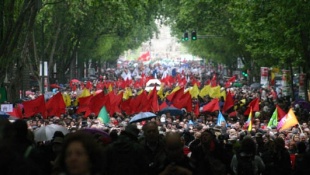Translated "Avante!" article by Albano Nunes, Member of the Secretariat of the CC
Year 1935. Fascism spreads throughout Europe. Hitler, by the hand of the German monopolies, comes to power, in Berlin, in January 1933. In Italy, Bulgaria, Hungry as well as in other countries, the growing the rise of the workers’ and revolutionary movement, and which the October Revolution stirred and threatened the capital power, is squeezed and defeated, and the communist parties illegalized. In Portugal, the 1933 “Constitution”, marks fascism institutionalization and consolidation, in the years to come. Within the framework of capitalism crisis deepening and the sharpening of inter-imperialist rivalries, whilst in the USSR socialism building registers notable successes, the dangers of war develop dramatically.
Within this context, which was prepared at length and took place (in Moscow, from July 25th to August 20th, 1935), the VII Congress of the Communist International, a congress that was the last of the C.I., was particularly important, by having operated a deep turn in the communist movement guidelines, having adapted the political and organization guideline to the new conditions by answering to the need of performing a hard combat unto fascism and war, updating and précising analysis ( as regarding fascism definition of the class nature, as being a terrorist monopolist dictatorship) and overcome conceptions and sectarian practises, which obstructed the communist parties growth, tightening alliances among the workers’ class and weakened the vanguard liaison with the popular masses. Adopted in an ambiance of great unity among the delegates of the 76 parties and organizations represented, the workers class unique front and the deep renovation of the working method – as the work in trade-unions and other mass fascist organizations – greatly contributing to elevate the communist parties prestige and by replacing Leninist principles and methods where they had weakened, increasing their capacity of promoting the workers movement unity with the anti-fascist forces. The C.I. as a centralized international organization, in which each party was its own “section”, ended formally in 1943, but never forgetting that previously the parties had practiced growing autonomy and independence, a practise the VII Congress recognized and reinforced.
Alvaro Cunhal wrote - “ On what concerns the PCP –the VII Congress of the Communist International conclusions were a powerful contribution to make the Party come out of its shell regarding its underground activity, sectarian trend, which consisted in considering the underground activity as the unique revolutionary possible activity and which resulted by the effective estrangement of communists from the working class, the change of the party into a “sect” away from the masses, extremely vulnerable before repression coups”. Bento Gonçalves, imprisonment upon his return from Moscow, where he led the Party’s delegation, retarded the new guidance assimilation. But did not avoid to it be creatively applied to Portugal’s situation within the reorganization framework, in 1940/41.
In spite of some resistances, namely amid the trade-union front, a turn-over took place with the Party, concerning the mass work, by using all possibilities of legal action, with the help of an indestructible underground structure. The important strikes of the 40’s, as well as the appearance of the MUNAF and MUD, owe a lot to the VII Congress of the C.I regarding its inspired guidelines. They were a great valuable contribution for the PCP’s development and affirmation, as a great national party, the vanguard of the worker class and the leader force of the anti-fascist democratic movement.
